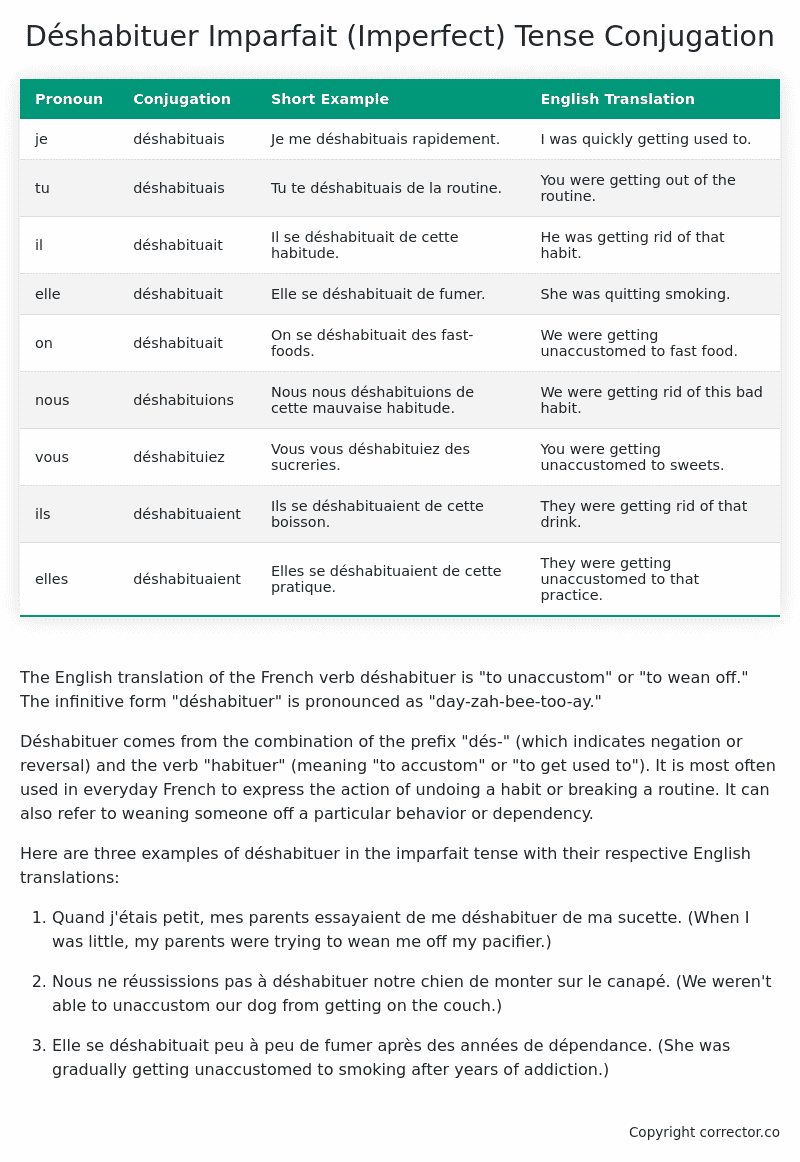Imparfait (Imperfect) Tense Conjugation of the French Verb déshabituer
Introduction to the verb déshabituer
The English translation of the French verb déshabituer is “to unaccustom” or “to wean off.” The infinitive form “déshabituer” is pronounced as “day-zah-bee-too-ay.”
Déshabituer comes from the combination of the prefix “dés-” (which indicates negation or reversal) and the verb “habituer” (meaning “to accustom” or “to get used to”). It is most often used in everyday French to express the action of undoing a habit or breaking a routine. It can also refer to weaning someone off a particular behavior or dependency.
Here are three examples of déshabituer in the imparfait tense with their respective English translations:
-
Quand j’étais petit, mes parents essayaient de me déshabituer de ma sucette.
(When I was little, my parents were trying to wean me off my pacifier.) -
Nous ne réussissions pas à déshabituer notre chien de monter sur le canapé.
(We weren’t able to unaccustom our dog from getting on the couch.) -
Elle se déshabituait peu à peu de fumer après des années de dépendance.
(She was gradually getting unaccustomed to smoking after years of addiction.)
Table of the Imparfait (Imperfect) Tense Conjugation of déshabituer
| Pronoun | Conjugation | Short Example | English Translation |
|---|---|---|---|
| je | déshabituais | Je me déshabituais rapidement. | I was quickly getting used to. |
| tu | déshabituais | Tu te déshabituais de la routine. | You were getting out of the routine. |
| il | déshabituait | Il se déshabituait de cette habitude. | He was getting rid of that habit. |
| elle | déshabituait | Elle se déshabituait de fumer. | She was quitting smoking. |
| on | déshabituait | On se déshabituait des fast-foods. | We were getting unaccustomed to fast food. |
| nous | déshabituions | Nous nous déshabituions de cette mauvaise habitude. | We were getting rid of this bad habit. |
| vous | déshabituiez | Vous vous déshabituiez des sucreries. | You were getting unaccustomed to sweets. |
| ils | déshabituaient | Ils se déshabituaient de cette boisson. | They were getting rid of that drink. |
| elles | déshabituaient | Elles se déshabituaient de cette pratique. | They were getting unaccustomed to that practice. |
Other Conjugations for Déshabituer.
Le Present (Present Tense) Conjugation of the French Verb déshabituer
Imparfait (Imperfect) Tense Conjugation of the French Verb déshabituer (You’re reading it right now!)
Passé Simple (Simple Past) Tense Conjugation of the French Verb déshabituer
Passé Composé (Present Perfect) Tense Conjugation of the French Verb déshabituer
Futur Simple (Simple Future) Tense Conjugation of the French Verb déshabituer
Futur Proche (Near Future) Tense Conjugation of the French Verb déshabituer
Plus-que-parfait (Pluperfect) Tense Conjugation of the French Verb déshabituer
Passé Antérieur (Past Anterior) Tense Conjugation of the French Verb déshabituer
Futur Antérieur (Future Anterior) Tense Conjugation of the French Verb déshabituer
Subjonctif Présent (Subjunctive Present) Tense Conjugation of the French Verb déshabituer
Subjonctif Passé (Subjunctive Past) Tense Conjugation of the French Verb déshabituer
Subjonctif Imparfait (Subjunctive Imperfect) Tense Conjugation of the French Verb déshabituer
Conditionnel Présent (Conditional Present) Tense Conjugation of the French Verb déshabituer
Conditionnel Passé (Conditional Past) Tense Conjugation of the French Verb déshabituer
Conditionnel Passé II (Conditional Past II) Tense Conjugation of the French Verb déshabituer
L’impératif Présent (Imperative Present) Tense Conjugation of the French Verb déshabituer
L’impératif Passé (Imperative Past) Tense Conjugation of the French Verb déshabituer
L’infinitif Présent (Infinitive Present) Tense Conjugation of the French Verb déshabituer
L’infinitif Passé (Infinitive Past) Tense Conjugation of the French Verb déshabituer
Le Participe Présent (Present Participle) Tense Conjugation of the French Verb déshabituer
Le Participe Passé (Past Participle) Tense Conjugation of the French Verb déshabituer
Struggling with French verbs or the language in general? Why not use our free French Grammar Checker – no registration required!
Get a FREE Download Study Sheet of this Conjugation 🔥
Simply right click the image below, click “save image” and get your free reference for the déshabituer imparfait tense conjugation!

Déshabituer – About the French Imparfait Tense
NOTE: To take a deep dive into all the French tenses then see our article on Mastering French Tense Conjugation.
Formation of the Imparfait Tense
For regular -er verbs:
For regular -ir verbs
For regular -re verbs
Common Everyday Usage Patterns
Description of Past Habits
Background Information
Mental and Emotional States
It’s employed to express emotions, thoughts, or physical sensations in the past. For example: “J’étais content quand il est arrivé.” (I was happy when he arrived.)
Ongoing Actions
Points to Note About the Imparfait Tense
Passé Composé vs. Imparfait
Conditional
Si Clauses
Narration
I hope you enjoyed this article on the verb déshabituer. Still in a learning mood? Check out another TOTALLY random French verb imparfait conjugation!


